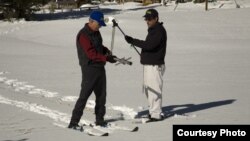The snowpack in California's Sierra Nevada mountains probably shrank to the lowest in 500 years this year and climate change may cause further declines, worsening water shortages in the drought-stricken state, a U.S. study said on Monday.
The snowpack in the mountain range this spring was just 5 percent of the average in the second half of the 20th century and scientists said the findings indicated "the 2015 low is unprecedented in the context of the past 500 years."
The low was based on records of snowfall and temperatures inferred from annual growth rings of blue oaks and other trees, meaning some uncertainties about extremes in past centuries.
The record low was an "ominous sign" of the severity of a record drought in the state since 2012 that is affecting everything from agriculture to hydropower generation, the scientists wrote in the journal Nature Climate Change.
On Sunday, California governor Jerry Brown declared a state of emergency in two counties where wildfires have destroyed hundreds of homes and forced thousands of residents to flee.
"Sierra Nevada snowpack plays a critical role in replenishing the state's water reservoirs and provides 30 percent of its water supply," according to the study, led by the University of Arizona.
Global warming was projected to "further increase the probability of severe drought events," they wrote.
Valerie Trouet, one of the authors at the University of Arizona, told Reuters there were reasons to believe that man-made warming "played an important role in the 2015 snowpack low" even though such extremes may be just freak natural events.
The scientists also said the uncertainties in Monday's tree ring data indicated that a few years, mainly in the 16th century, might have had snowpack lows even lower than the 2015 numbers.
The study found that the depth of snow at 108 measuring stations in the Sierra Nevada on April 1 was just 5.75 cm (2.3 inches) in "snow water equivalent" — the depth of the water if the snow melted — against an average 69.8 cm from 1930-2014.
Snows are retreating in many parts of the world because of higher temperatures, blamed by a U.N. panel of climate experts on rising emissions from burning fossil fuels. They say warming is causing more heatwaves, downpours and rising sea levels.
Since 1955, the U.S. Environmental Protection Agency says that April snowpack has declined on average by about 23 percent at measuring sites across the western United States.





